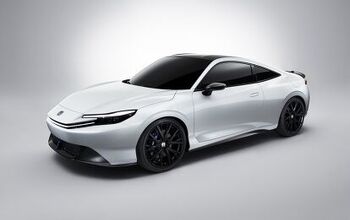Renault Chairman Gives Himself One Year to Fix Alliance With Nissan

Now that the Renault-Nissan-Mitsubishi Alliance has its upper echelon sorted, the time has come to mend the partnership properly. With the new staffers healthily distanced from the old guard of the Ghosn era, Renault Chairman Jean-Dominique Senard is giving himself one year to fix things before considering the entire issue a “failure, on a personal level, and by our teams.”
Senard didn’t explain the benchmarks for success, and twelve months doesn’t allot much time to right a ship that’s been listing for several years. Rumors exist that Renault may even be looking to ditch Nissan for becoming too much of a burden. Meanwhile, the Japanese automaker’s former CEO, Hiroto Saikawa, estimated the company’s vast restructuring efforts would not significantly improve profitability for at least another year.
However, most of what we’ve heard from Nissan and Renault leadership includes a concerted effort to restore trust within the auto alliance and strengthen industrial ties. Contentious merger talks have also fallen by the wayside and are unlikely to crop up after Renault’s own profitability warning from earlier this month.
That may be good news for Japanese investors concerned with French influence. Renault is undoubtedly looking at its balance sheet and someone has probably brought up the possibility of selling assets, including Nissan shares. The French automaker currently owns 43 percent of company with voting rights. Meanwhile, France’s government has a 15-percent stake in Renault — often flexing a bit of bureaucratic muscle to help steer the automaker’s trajectory. But some analysts suggest the company could also be seeking to cut those ties, as well.
The Commissioner of French State Holdings, Martin Vial, has similarly entertained the possibility of the alliance shifting its balance — including reduced governmental involvement. But nothing official has been announced by any of the involved parties.
What is certain is that Nissan’s lower earnings has negatively impacted Renault, with the French carmaker developing a much bleaker outlook for the future. Weakening global economies, fast-changing emission rules, and diminished demand for new cars may have also played an important factor.
It’s too early to automatically assume the alliance is about to fracture, however. According to Reuters, Senard said collaborative industrial projects between Renault and Nissan would take priority over any discussions of a potential merger deal with Fiat Chrysler Automobiles. He also suggested that reducing Renault’s stake in Nissan didn’t sound particularly appetizing.
“Nothing can ever be excluded, [but] this is not what we’re focused on,” he said.
Nissan’s replacement for Saikawa, Makoto Uchida, has similarly promised to improve alliance relations, adding that the Japanese firm was “ on the right path for recovery.” Scheduled to assume his new post as CEO in January, the incoming boss has already warned that the automaker’s recovery will take some time.
[Image: Renault]

A staunch consumer advocate tracking industry trends and regulation. Before joining TTAC, Matt spent a decade working for marketing and research firms based in NYC. Clients included several of the world’s largest automakers, global tire brands, and aftermarket part suppliers. Dissatisfied with the corporate world and resentful of having to wear suits everyday, he pivoted to writing about cars. Since then, that man has become an ardent supporter of the right-to-repair movement, been interviewed on the auto industry by national radio broadcasts, driven more rental cars than anyone ever should, participated in amateur rallying events, and received the requisite minimum training as sanctioned by the SCCA. Handy with a wrench, Matt grew up surrounded by Detroit auto workers and managed to get a pizza delivery job before he was legally eligible. He later found himself driving box trucks through Manhattan, guaranteeing future sympathy for actual truckers. He continues to conduct research pertaining to the automotive sector as an independent contractor and has since moved back to his native Michigan, closer to where the cars are born. A contrarian, Matt claims to prefer understeer — stating that front and all-wheel drive vehicles cater best to his driving style.
More by Matt Posky
Latest Car Reviews
Read moreLatest Product Reviews
Read moreRecent Comments
- Jalop1991 is this anything like a cheap high end German car?
- HotRod Not me personally, but yes - lower prices will dramatically increase the EV's appeal.
- Slavuta "the price isn’t terrible by current EV standards, starting at $47,200"Not terrible for a new Toyota model. But for a Vietnamese no-name, this is terrible.
- Slavuta This is catch22 for me. I would take RAV4 for the powertrain alone. And I wouldn't take it for the same thing. Engines have history of issues and transmission shifts like glass. So, the advantage over hard-working 1.5 is lost.My answer is simple - CX5. This is Japan built, excellent car which has only one shortage - the trunk space.
- Slavuta "Toyota engineers have told us that they intentionally build their powertrains with longevity in mind"Engine is exactly the area where Toyota 4cyl engines had big issues even recently. There was no longevity of any kind. They didn't break, they just consumed so much oil that it was like fueling gasoline and feeding oil every time


































Comments
Join the conversation
Put the alliance aside, and find a tailor that befits a Chairman of an international automaker.
Americans consider a brown suit and tie not proper business attire but those of us that remember President Reagan who often wore brown suits. It appears that the suit is more taupe but the tie is definitely brown. "Taupe is a dark brown color between brown and gray. The word derives from the French noun taupe meaning "mole". The name originally referred only to the average color of the French mole, but beginning in the 1940s, its usage expanded to encompass a wider range of shades." Wikipedia Nissan's problems are more significant than a leader who wears a brown suit and tie.